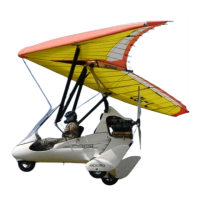7.1.2 Engine Failure on Climb Out
If your engine fails on climb out
- with enough distance to land immediately keep direction and land straight,
- with enough height for turning back safely and with weak take off wind allowing to
land in tail wind
turn back and land in tailwind, in front of the take off run.
Restart is allowed only if the cause of the failure has been corrected.
7.1.3 Engine Failure in Cruising
In all circumstances the flight path is to be selected that in case of an unintentional
motor stoppage a safe landing should be executable onto a safe terrain. This means
that for a safe flight the height to be kept over obstacles is the one that makes a safe
landing possible onto a preplanned field from any point of the flight path. After an
emergency landing restart is allowed only if the cause of the failure has been
revealed and corrected.
WARNING
For the safety of flights with a WSC aircrafts the pilot is to watch the terrain below
and in every second of the flight he is to be aware of the possible landing fields,
which can be selected for an emergency landing.
NOTE
The warning above is valid for take off climb out, as well.
7.2 The motor gets warm.
The temperature of the motor may climb over the allowed one for different reasons, (e.g.
running the motor with an RPM over the limitations, leaking therefore decreasing amount
of cooling liquid, dirt preventing free flow within the cooling radiator, ventilator driving belt
slips or gets broken etc.). If the temperature climbs over the allowed one cool back the
motor in gliding flight, go on flying and repair the failure when landing. If the cooling is not
effective enough make an emergency landing.
Restart is allowed only if the cause of the failure has been revealed and eliminated.
7.3 Carburetor fire
As there has not a single example for carburetor fire occurred during the past thirty years
of Apollo practice with operating Rotax engines, therefore Apollo considers the probability
of the occurrence of such an aircraft incident practically negligible. This condition is
especially valid to the Apollo C15 DD - Delta Jet 2 – R 912 WSC aircraft type. However
as the phenomenon is well known in connection with reciprocating engines and as such a
case can theoretically emerge here stays the standard procedure to be followed to
prevent accidents generated by carburetor fire:
- Close the fuel tap,
- give full gas,
- make the motor run out of fuel and
- make a stopped motor landing.
Report the case to Apollo and follow its advices.

